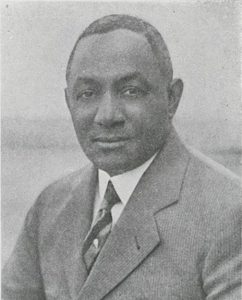
Casper Holstein
*Casper Holstein was born on this date in 1876. He was a Black mobster involved in the Harlem "numbers rackets."
Born of mixed African and Danish descent in St. Croix, Danish West Indies, Casper Holstein moved to New York City with his mother in 1894. His father was a landed Mulatto owner of a large farm who was, in turn, the son of a Danish officer in the Danish West Indies Colonial militia. After attending high school in Brooklyn, he enlisted in the United States Navy after graduation. During World War I, he revisited his birthplace while stationed in what had become the United States Virgin Islands.
After the war, Holstein worked as a janitor and doorman in Manhattan, eventually becoming a head messenger for a commodities brokerage on Wall Street. He, along with Stephanie St. Clair, was responsible for bringing back illegal gambling to the neighborhood after an eight-year absence following Peter H. Matthews's conviction in 1915. During this time, he became familiar with the stock market and studied the system and numbers.
He was eventually able to devise a lottery system based on those principles. Before Matthews, the number was set by a system in which a set of 0 to 9 was drawn out randomly and posted in a clubhouse. This, however, allowed the organizer to cut losses by fixing the outcome. It also created limitations on disseminating the winning number to the gamblers. The newspapers published Unrelated statistical numbers, which Holstein could use as an organizer instead. The US Customs House receipts, New York Stock Exchange daily share volume, and leading horse race pari-mutuel betting handle have all been used to set the daily number. This change permitted many gamblers to play the same game without fear of fixing.
As Prohibition began, Holstein's lottery system proved popular, and he soon became known as the "Bolita King," earning an estimated $2 million from his lotteries. In 1932, Dixie Davis, the courthouse attorney who provided service for the runners for many of the number’s operators, decided that he could make more money if he were to take over as central organizer. To enforce his seizure of power, he brought in Dutch Schultz, who could see that Prohibition, which had proved lucrative for him, was reaching its end. Rather than accept a back seat, however, he decided he wanted the central role. One by one, various numbers operators were picked up by Schultz and told they would have to deal with him.
Most complied, but Madame Stephanie St. Clair and Bumpy Johnson resisted him. Holstein saw himself as having a political mission that would be undermined by violence and dropped out of active or central involvement in overseeing the street collection. The numbers game then continued operating with mostly Black collectors and mid-level management. This was under mostly White leadership and by St. Clair and Johnson. Holstein continued on the periphery as a wholesale lay-off gambler for several years but was arrested and stopped in 1937.
Holstein was a significant donor towards charitable purposes such as building dormitories at Black colleges and financing many of the neighborhood's artists, writers, and poets during the Harlem Renaissance. He bought the mortgage on the New York hall of the Universal Negro Improvement Association. He allowed it to continue to be used as a Black function hall until the organization collapsed. He then developed the site as Holstein Court, a residential building for Black business owners and professionals. He also helped establish a Baptist school in Liberia and a hurricane relief fund for his native Virgin Islands. He was a regular contributor of articles to the NAACP newspaper The Crisis. In 1928, he was kidnapped by five white men who demanded a ransom of $30,000. He was released three days later, insisting that no ransom was paid. The incident was never explained. He died on April 5, 1944.